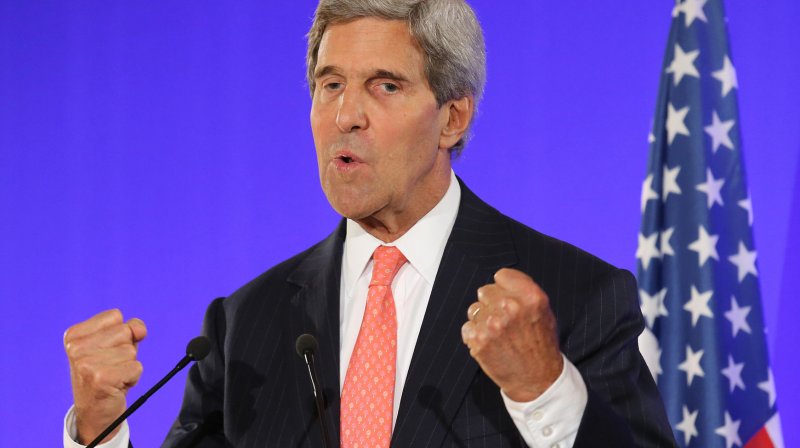1 of 4 | U.S. Secretary of State John Kerry addresses the media during a joint press conference with French Foreign Minister Laurent Fabius on the subject of the crisis in Syria at the Ministry of Foreign Affairs in Paris on September 7, 2013. Kerry and Fabius claimed growing international support for a "strong" response to the Syrian government's alleged use of chemical weapons. UPI/David Silpa |
License Photo
LONDON, Sept. 9 (UPI) -- If Syrian President Bashar Assad wants to fend off an attack, he would hand over his chemical weapons cache quickly, U.S. Secretary of State John Kerry said.
But Kerry also said Monday he didn't think Assad would do such a thing while expressing doubt about whether it was even feasible as Syria was in the throes of a 2 1/2-year civil war, The New York Times reported.
"He could turn over every single bit of his chemical weapons to the international community in the next week -- turn it over, all of it, without delay and allow the full and total accounting," Kerry said during a joint meeting in London with British Prime Minister William Hague. "But he isn't about to do it, and it can't be done."
Kerry was wrapping up his European effort to press the case for a strike against Syria. With an uncertain congressional vote to authorize a military strike because of evidence Assad attacked his citizens Aug. 21 with chemical weapons in Damascus suburbs, Kerry maintained that the United States recognized that diplomacy was the only way to achieve resolution in the troubled country while maintaining that the chemical attack demanded a response, the Los Angeles Times reported.
"A resolution to this has to come about because the parties are prepared to come and negotiate that political solution," Kerry said in London after the meeting. "If one party believes that he can rub out countless numbers of his own citizens with impunity, using chemicals that have been banned for nearly a hundred years because of what Europe learned in World War I ... we will never come to a negotiating table."
The British government decided not to participate in any armed reprisal against Damascus.
While acknowledging the concern about getting entangled in a conflict, Kerry said any strike on Syria would be limited.
"We're not talking about war. We're not going to war. We will not have people at risk in that way," Kerry said. "We will be able to hold Bashar Assad accountable without engaging in troops on the ground or any other prolonged kind of effort, in a very limited, very targeted, very short-term effort that degrades his capacity to deliver chemical weapons, without assuming responsibility for Syria's civil war."
Kerry's comments Monday followed the release of comments made by Assad during an interview to be broadcast by CBS in which the Syrian president dismissed U.S. intelligence that concluded his regime gassed a Damascus suburb, resulting in more than 1,400 deaths. Assad compared the current intel to the false assertion of stockpiles of weapons of mass destruction in Iraq a decade ago.
"I'm confident about the state of the evidence," Kerry said. "What does he offer? Words that are contradicted by facts. And he doesn't have a very strong record with respect to this question of credibility."
Hague said the United States still has Britain's "full diplomatic support" concerning Syria, the Los Angeles Times said, even though Prime Minister David Cameron ruled out joining a military strike after a no vote in Parliament.
Asked what steps Britain might take on Syria since Parliament vetoed military action, Hague indicated the British government may increase the amount of non-lethal support to the Syrian opposition, The New York Times said. He also said Britain would be engaged diplomatically and would push to ensure humanitarian aid reached the Syrians who need it.















